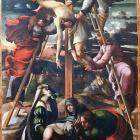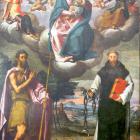Maria Vittoria Spissu is Associate Professor in the Faculty of Arts at the University of Bologna. She was a Marie Skłodowska-Curie Global Fellow at the Center for Renaissance Studies of the Newberry Library, Chicago. She is currently a member of the international research group "Spanish Italy and the Iberian Americas" (directed by Columbia University professors Michael Cole and Alessandra Russo and funded by the Getty Foundation) and the EU-funded Cost Action "Islamic Legacy: Narratives East, West, South, North of the Mediterranean (1350-1750)". She is the principal investigator of "Global Empires, Artistic Mobility and Connected Histories" (UNIBO).
Her research and publications focus on the history of the Mediterranean Renaissance, the connections between Spanish Italy, the Spanish Netherlands, the Iberian Peninsula, and the Iberian-American viceroyalties, with an emphasis on the dissemination of models, itinerant foreign painters, and the construction of ideologies, imperial and Catholic, through paintings, prints, and books. Her latest book is entitled La Via dei Retabli: Le frontiere europee degli altari dipinti nella Sardegna del Quattro e Cinquecento (2018). Her most recent essay is "Traveling Models in the Iberian Marian Atlas: Pathos and Consensus between Flemish Mediterranean Networks and the Viceroyalty of New Spain". She also recently organized a symposium entitled "Empire of Concord? Communities and Authority in the Early Modern Iberian Worlds". She is co-editing a collective volume entitled "Ambivalent Harmonies: Representing Peace in Times of Conflict in the Early Modern Iberian Worlds.



